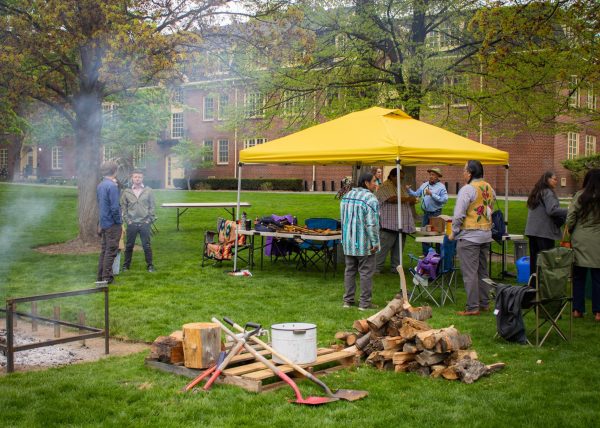Aldahleh Seeks Support for Possible EMS Program
December 4, 2016
A first-year ASWC senator is in the process of creating a student-run volunteer emergency medical service. Omar Aldahleh began work on planning a service that would provide rapid-response aid to minor medical issues on campus just before he came to Whitman. Aldahleh recently brought up for the service, tentatively called Whitman Emergency Services and Transportation (WEST), at ASWC’s Nov. 13 Senate meeting.
WEST would be, at least a first, predominantly a weekend service providing basic medical assistance and, when necessary, transport to the Health Center for students on and around the Whitman campus. The program would be modeled after similar programs at various other colleges and universities, including four of Whitman’s 13 peer institutions and Oregon’s Willamette University, which Aldahleh cites as a “standout.”
“This is a trend that’s coming across college campuses, and students have shown great support for these programs across different colleges, and across different parts of the U.S.,” Aldahleh said. “And it seemed completely reasonable for Whitman College to also engage in making our campus safer by providing a large support net through these programs.”
Aldahleh says that WEST would be able to provide a faster response to student emergencies than the Walla Walla Fire Department’s EMS service because of its proposed location on campus and familiarity with the college.
“Students know the campus better,” Aldahleh said. “It’s a big campus and it’s confusing. If you tell a firefighter, ‘I’m in Jewett 3-West, and I need help’ it might not necessarily make sense.”
The fire department would still be involved with more serious calls, especially those requiring Advanced Life Support, which the Walla Walla Fire Department provides for much of the county.
WEST is currently still in embryonic form. Aldahleh says he is working out the kinks in the proposed program’s operating guidelines, coordinating with relevant campus entities like the Health Center itself, seeking a potential medical director and looking for ways to fund the program. Currently, he is considering applying for an ASWC savings grant, which could get the program running for a period of a couple years in the hopes that it will gain more permanent funding elsewhere.
“Although we’ve done a lot of work, there’s still a lot that needs to be done,” Aldahleh said. “We’re still looking for money, and we’re still looking for more members, if people are interested.”
Some Whitman students, of course, are already involved in EMS work. One such student, Andreas Guerrero, got his EMT license over the summer and hopes to work with the Walla Walla Fire Department. Guerrero wants to be a doctor and said that he hopes his work with the Fire Department will give him valuable and rewarding experience in the medical field. He’s also cautiously optimistic about WEST, though he hasn’t been heavily involved in the program’s formation.
“I think it’s a really good idea. I don’t know how you’d implement it, because the problem with working EMTs is that generally they need to be licensed to work. And that comes from the state, but you can only be licensed if you’re affiliated with an organization that the state is allowed to give licenses to.”
Health Center Director Claudia Ness has similar concerns. Medical work of any kind, she says, has strict licensing requirements, and anyone serving in an EMS capacity, even if licensed, could be held liable if they made a mistake in carrying out their duties or attempted treatment that they were not licensed for. Concerns about liability, along with the relatively fast response already provided by the Walla Walla City Fire Department’s ambulance station one mile away, sunk a similar attempt to start a student emergency service six years ago, she said.
“To bring on an emergency squad of any sorts, there are potentially some dollars associated with it, and for sure a lot of liability that would have to be worked out as far as the college’s liability, the individual volunteers’ liability, things like that. So it does take a very, very close eye to look through all of those bits and pieces,” Ness said. “If they chose to follow through with it, and if it was authorized by administration, I would be helpful and supportive of it. It’s kind of a shaky situation though–I would have to see the whole plan before I would be able to make up my mind in regards to what we could do to support students in that effort.”
Aldahleh is working on that. Fifteen people have already reached out to him to indicate their interest in volunteering, but not all of them are certified or licensed to work as EMTs. Aldahleh hopes to coordinate with Walla Walla Community College, which has its own EMT training program, to provide training to WEST volunteers. In that course, volunteers would take a national exam, the National Registry for EMTs, which would grant them the certifications required to work with a licensed EMS service–which, of course, would be yet another hurdle for WEST. And how any potential liability would be distributed in the case of an accident has yet to be worked out.
Of course, Aldahleh notes, all of this is still a twinkle in his eye. But it’s a twinkle he’s serious about.
“I’ve had to call 911 three times already as a student. And I know in one of those cases, that was a really life-or-death scenario, and I’m kind of disappointed that we as a community don’t have things like this in place in order to make sure that students are safe,” Aldahleh said. “I genuinely believe that programs like this will help to save lives here on campus.”







